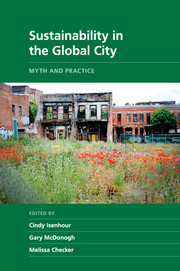Crossref Citations
This Book has been
cited by the following publications. This list is generated based on data provided by Crossref.
LOW, SETHA
2017.
SUNTA's Senior Scholar/Lifetime Award: Reflections on My Career and Urban Anthropology.
City & Society,
Vol. 29,
Issue. 3,
p.
355.
Balsas, Carlos
2017.
Blending Individual Tenacity with Government’s Responsibility in the Implementation of US Non-motorized Transportation Planning (NMT).
Planning Practice & Research,
Vol. 32,
Issue. 2,
p.
197.
Wachsmuth, David
and
Angelo, Hillary
2018.
Green and Gray: New Ideologies of Nature in Urban Sustainability Policy.
Annals of the American Association of Geographers,
Vol. 108,
Issue. 4,
p.
1038.
Elliott, Rebecca
2018.
The Sociology of Climate Change as a Sociology of Loss.
European Journal of Sociology,
Vol. 59,
Issue. 3,
p.
301.
Bertin, Mattia
Maragno, Denis
and
Musco, Francesco
2019.
Pianificare l'adattamento al cambiamento climatico come gestione di una macro-emergenza locale.
TERRITORIO,
p.
138.
McKinnon, Innisfree
Hurley, Patrick T
Myles, Colleen C
Maccaroni, Megan
and
Filan, Trina
2019.
Uneven urban metabolisms: toward an integrative (ex)urban political ecology of sustainability in and around the city.
Urban Geography,
Vol. 40,
Issue. 3,
p.
352.
Wang, Lili
and
Zhang, Xiaoling
2019.
Remaking Sustainable Urbanism.
p.
37.
Yazar, Mahir
Hestad, Dina
Mangalagiu, Diana
Saysel, Ali Kerem
Ma, Yuge
and
Thornton, Thomas F.
2020.
From urban sustainability transformations to green gentrification: urban renewal in Gaziosmanpaşa, Istanbul.
Climatic Change,
Vol. 160,
Issue. 4,
p.
637.
Bertin, Mattia
Musco, Francesco
and
Fabian, Lorenzo
2020.
Rethinking planning hierarchy considering climate change as global catastrophe.
Climate Risk Management,
Vol. 30,
Issue. ,
p.
100252.
Maurer, Megan
2020.
Nourishing Environments, Caring Cities: Gardening and the Social Reproduction of the Urban Environment in Deindustrial Michigan.
City & Society,
Vol. 32,
Issue. 3,
p.
716.
O'Reilly, Jessica
Isenhour, Cindy
McElwee, Pamela
and
Orlove, Ben
2020.
Climate Change: Expanding Anthropological Possibilities.
Annual Review of Anthropology,
Vol. 49,
Issue. 1,
p.
13.
Isenhour, Cindy
and
Berry, Brieanne
2020.
“Still good life”: On the value of reuse and distributive labor in “depleted” rural Maine.
Economic Anthropology,
Vol. 7,
Issue. 2,
p.
293.
Meilvang, Marie Leth
2021.
From rain as risk to rain as resource: Professional and organizational changes in urban rainwater management.
Current Sociology,
Vol. 69,
Issue. 7,
p.
1034.
Randle, Sayd
2021.
Battling Over Bathwater: Greywater Technopolitics in Los Angeles.
City & Society,
Vol. 33,
Issue. 3,
p.
444.
Marquina, Tatiana
Emery, Marla
Hurley, Patrick
and
Gould, Rachelle K.
2022.
The ‘quiet hunt’: the significance of mushroom foraging among Russian-speaking immigrants in New York City.
Ecosystems and People,
Vol. 18,
Issue. 1,
p.
226.
Low, Setha
2022.
CUAA: We Have Always Been Critical Engaged Urbanists.
City & Society,
Vol. 34,
Issue. 1,
p.
24.
Jung, Yoonhee
2023.
A move towards just sustainability: transformation of discourses around urban sustainability planning in Seoul, Republic of Korea.
Local Environment,
Vol. 28,
Issue. 3,
p.
347.
Zaro, Gregory
Blaće, Ante
Baraka Perica, Josipa
Čelhar, Martina
Jurković Pešić, Filipa
and
Gusar, Karla
2023.
Fleeting fields of Zadar (Croatia): characterizing millennial-scale urban landcover change, green space, and resilience into the twenty first century.
Frontiers in Ecology and Evolution,
Vol. 11,
Issue. ,
Li, Yilong
Tang, Yu-Ting
Tan-Mullins, May
and
Ives, Christopher D.
2023.
Exploring the Potential Opportunities of China’s Environmental Agenda, Ecological Civilization, on Global Sustainable Development.
Sustainability,
Vol. 15,
Issue. 6,
p.
5135.
Stålhammar, Sanna
and
Raymond, Christopher M.
2024.
Contested representations of benefits of urban nature in a densifying marginalised neighbourhood.
Journal of Environmental Planning and Management,
p.
1.



